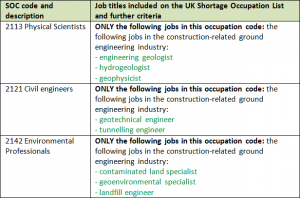The Ground Forum is delighted to announce that 19 ground engineering job titles have been included in the new ‘Shortage Occupations List’ (SOL) which was published by the Migration Advisory Committee on 9th September. Inclusion of these 19 ground engineering jobs in the new SOL means that, when the new points based immigration system comes into operation, these occupations will qualify for a work permit without having to accumulate sufficient points by other means. In the meantime the 16 ground engineering disciplines remain on the old SOL, as negotiated by Ground Forum in 2005 and 2007.
Inclusion of these ground engineering occupations on the SOL has been described as “our life saver” by one senior geotechnical consultant. Why? Because it aids recruitment of skilled staff from outside the European Economic Area (EEA) without which timely delivery of the ground engineering sector’s current workload would be impossible.
The Migration Advisory Committee (MAC) was set up by the UK Border Agency, a department within the Home Office, in 2007 in order to provide independent and rigorous identification of those occupations suffering shortages in the UK, with persistent vacancies which cannot be filled from within the EEA.
Keith Gabriel, the Chairman of Ground Forum, commented “we are delighted that the MAC has recognised the continuing skills shortage affecting the ground engineering sector” and added “I wish to acknowledge the excellent work carried out by Dianne Jennings and her team in Ground Forum’s secretariat; we had only three weeks in April to undertake the necessary research and compile a full report for the MAC; they pulled out all the stops to ensure that our research and report were both comprehensive and submitted on time – a superb effort.”
The ground engineering job titles included in the new Shortage Occupation List are included under two classes of the Standard Occupational Classification 2000 (SOC):
Civil Engineer (SOC 2121):
Geotechnical Engineer
Geotechnical Design Engineer
Geotechnical Specialist
Tunnelling Engineer
Geologists (plus Physicists and Meteorologists) (SOC 2113):
Geologist
Geological Engineer
Hydrogeologist
Geophysical Specialist
Geophysicist
Geoscientist
Contaminated Land Engineer
Geoenvironmental Engineer
Reservoir Panel Engineer
Rock Mechanics Engineer
Soil Mechanics Engineer
Geomechanics Engineer
Landfill Engineer
Contaminated Land Specialist
Geoenvironmentalist
For full details of the new SOL and the accompanying reports see:http://www.ukba.homeoffice.gov.uk/aboutus/workingwithus/indbodies/mac/macfirstshortagelist/
Anyone wishing to employ people from outside the EEA now also needs a licence. Go to http://www.ukba.homeoffice.gov.uk/employers/points/ for an application form and for information about the requirements that HR systems and companies must meet in order to obtain a licence.
